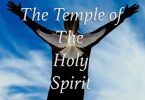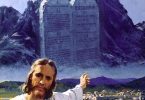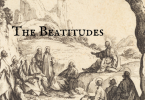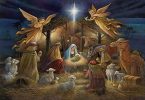(18th Sunday of Ordinary Time)
Scriptures: Is. 55:1-3; Ps. 144:8-9, 15-18; Rom. 8:35:37-39; Mt. 14:13-21
When India was pushed into lockdown in March 2020 due to the Corona Virus, the poor migrant workers started returning home. Some of them walked, cycled, travelled by different means of transport to their homes. Many heart touching stories surfaced in the Indian media. One of the incidences that will never be erased from my memory is a homeless man eating a dog’s carcass on the Delhi-Jaipur high way at Shahpura on 18 May. A Jaipur resident claimed on Facebook, “Humanity was put to shame in Shahpura when a labourer due to hunger was forced to eat a dead dog. What is worse is that no person stopped their vehicle and saw the need to help him. I gave him some food to eat and water to drink…” The statistics show us that there are about 690 million people who go to bed hungry every night. But the fact is that there is more than enough food produced to feed everyone in the world; this is one reality. There is yet another reality. Once a man came to me for counselling. He was very rich. He had everything; money, car, houses, bank balance, etc. His children were well settled. He had no need to work anymore. He had good health too. The only problem he had was his relationship with others was not good. He was not happy in his life with others. He gave lavish parties to his relatives and friends but they were not ready to relate to him. They never invited him to their celebrations. He was ostracized by others although he was rich. It disturbed him. He was not at peace. He wanted to rectify his mistake. He wanted to know what he should do in his life. I realized he had spiritual hunger. He was hungry for love.
Today’s liturgy talks about hunger. There are many incidences recorded in the Bible about hunger. The hunger became the cause of many things. Esau, the eldest son of Isaac came home exhausted and hungry from a hunt. Esau was dying of starvation. Jacob gave him food at the condition of acquiring his birthright. (Gen. 25:29-34). Another incident recorded later is of Jacob and his sons who went to Egypt because of the famine and hunger. It drove them to Joseph in Egypt (Gen. 41:53-42:7). The most famous incident of hunger known to the people of Israel i.e they travelled from Egypt into the wilderness. They were dying of hunger. God gave them manna and quail (Exodus 16). The incidents of hunger are recorded very often in the bible.
The first reading from the book of Isaiah, which is also called the book of consolation from chapters 40-55, gives us God’s consoling invitation to the people of Israel who were living in Babylonian exile. The Israelites were in exile. They had starved for food. While they were thinking of returning to their homeland, they were aware of their devastated homeland. They were frightened of not getting any food to eat. God gives them hope by promising abundant water, grain, milk, wine and bread. The text is loaded with the words of ‘come’, ‘listen to me’, ‘pay attention’, ‘come to me’, etc. It shows the Lord was full of mercy and love. He had forgiven their sins. He only remembered the covenant that he had made with David.
In the Gospel, we listen to the miracle of the multiplication of loaves and fish. It is the mighty miracle recorded after the resurrection of Jesus in the Gospel. This miracle is recorded in all the four Gospels. It appears six times in the Gospels. Twice in the Gospels of Mark and Matthew and once each in the Gospels of Luke and John. The passage begins with Jesus withdrew by boat to a lonely place. When he stepped ashore there was a large crowd. They had come after him on foot. Jesus took pity on them. He healed the sick. Luke also tells us the same but Mark would say Jesus taught them. Preaching and healing was a part of the proclamation of the kingdom of God. Jesus saw the spiritual hunger in the crowd. He had pity on them.
Later when the evening came, the disciples wanted the people to go home. They sighted a number of reasons such as lonely place, the time was not sufficient, no money to buy so much bread that people be satisfied, there were more than 5000 men alone with their wives and children. The disciples showed feeble faith. Whereas Jesus challenged his disciples to give the people something to eat themselves. But all that they had were five loaves and two fish. We know Jesus multiplied these five loaves and two fish to feed five thousand men. Jerome Biblical commentary says that there were half a million Jews who were living in Palestine at the time of Jesus. Five thousand men besides women and children would total up to 20 or 30 thousand. It means to say that Jesus is presented as feeding a tenth of the population. The Gospel says all ate as much as they wanted. The crowd represented entire Israel. They were satisfied and full. The remaining scraps were collected in twelve baskets full. The baskets represented the twelve tribes of Israel who would be replaced by the twelve apostles of Jesus. Jesus is seen as a fulfilment of the promise that God made to the people of Israel at the time of Isaiah.
It would be right to say, Hunger was fed by the love of Jesus. Jesus continues to feed our physical hunger as well as spiritual hunger till today in the sacrament of Eucharist. The early Christian community in the breaking of bread on the first day of the week recalled the teachings and works of Jesus. They remembered the love of Jesus for them. The most stirring experience they had about Jesus’ ministry was the feeding of the five thousand. That is why every evangelist wrote it in his Gospel. They also saw Eucharistic elements in the miracle. Jesus took bread, raised his eyes to heaven, said the blessings, broke the bread and handed them to his disciples are the words before the consecration in the Eucharist. The feeding of five thousand was a preparation for the institution of Eucharist.
The physical hunger is a dark reality in the world but the spiritual hunger is often overlooked. Jesus satisfied the spiritual as well as physical hunger of all those who came to him. When the time came for him to leave the world, Jesus instituted the Eucharist by which He feeds us every day with His Body and Blood (Jn. 13:1). He forgives our sins and He restores our lives in the Eucharist. When Jesus had shown his immense love for us, we need to be fearless like St. Paul. Therefore, in times of troubles, persecution, lack of food and clothes, being threatened and even attack; he says, “no one can come between us and the love of God.” Can we be fearless like St. Paul and sing …
Who shall separate us from the love of Christ? (2) From the love of Christ?
Shall tribulation, or distress, or persecution, famine, nakedness?
Who shall separate us from the love of Christ?
In all these things we are more than conquerors,
More than conquerors through Him that loved us.
(music & Lyrics: Cathy Gehr, Michael Fograrty)






